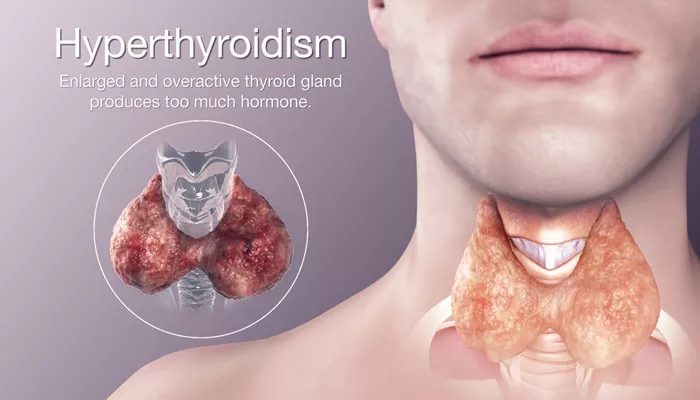Hyperthyroidism, also known as an overactive thyroid, is a condition where the thyroid gland produces excessive amounts of thyroid hormones. This can lead to a variety of symptoms and complications that can significantly impact a person’s health. The thyroid gland, located in the front of the neck, plays a crucial role in regulating metabolism, heart rate, and overall energy levels. When it becomes overactive, the body’s systems can become unbalanced, leading to serious health issues if left untreated.
Introduction to Hyperthyroidism
Hyperthyroidism affects millions of people worldwide and can occur at any age but is more prevalent in women and individuals over 60. The most common cause of hyperthyroidism is Graves’ disease, an autoimmune disorder where the immune system mistakenly attacks the thyroid gland. Other causes include thyroid nodules, thyroiditis (inflammation of the thyroid), and excessive iodine intake. Symptoms can develop gradually or suddenly, and while some may experience only mild symptoms, others may face severe manifestations that require immediate medical attention.
Recognizing the danger signs of hyperthyroidism is essential for early diagnosis and treatment. If not managed properly, hyperthyroidism can lead to serious complications such as heart problems, osteoporosis, and even a life-threatening condition known as thyrotoxic crisis. This article outlines the key danger signs associated with hyperthyroidism to help individuals identify potential symptoms early on.
Common Danger Signs of Hyperthyroidism
Rapid Heartbeat (Tachycardia)
One of the most alarming symptoms of hyperthyroidism is an irregular or unusually fast heartbeat. Individuals may experience palpitations or a pounding sensation in their chest. This can lead to increased anxiety and discomfort.
Weight Loss Despite Increased Appetite
Many people with hyperthyroidism notice significant weight loss even when they are eating more than usual. This occurs because the body’s metabolism accelerates due to excess thyroid hormones.
SEE ALSO: What Is The Cause of Systolic Hypotension?
Nervousness and Anxiety
Hyperthyroidism often manifests as heightened nervousness, anxiety, or irritability. Individuals may feel restless or unable to relax due to increased adrenaline levels in the body.
Increased Sweating and Heat Sensitivity
People with an overactive thyroid frequently report feeling excessively warm or sweaty, even in cooler environments. This sensitivity to heat can be uncomfortable and lead to skin irritation.
Tremors
A common physical sign of hyperthyroidism is trembling or shaking hands and fingers. This tremor can be subtle but may become more pronounced during periods of stress or excitement.
Fatigue and Muscle Weakness
While individuals may feel energetic initially due to increased metabolism, fatigue often sets in over time. Muscle weakness is also common, particularly in the upper arms and thighs.
Sleep Disturbances
Difficulty sleeping or insomnia is another prevalent symptom associated with hyperthyroidism. Individuals may find it hard to fall asleep or stay asleep due to racing thoughts or physical discomfort.
Frequent Bowel Movements or Diarrhea
An increase in bowel movements or episodes of diarrhea can occur as hyperthyroidism speeds up digestive processes.
Goiter (Enlarged Thyroid Gland)
A visible swelling at the base of the neck caused by an enlarged thyroid gland is known as a goiter. This can sometimes cause difficulty swallowing or breathing if it becomes large enough.
Menstrual Changes
Women with hyperthyroidism may experience irregular menstrual cycles, including lighter periods or missed cycles altogether.
Eye Problems (Thyroid Eye Disease)
Some individuals develop eye-related issues such as bulging eyes (exophthalmos), redness, dryness, or double vision due to inflammation around the eyes associated with Graves’ disease.
Skin Changes
Changes in skin texture may occur, including thinning skin or rashes such as hives (urticaria). Some individuals may also notice red palms or fine hair loss.
Thyrotoxic Crisis (Thyroid Storm)
In severe cases, hyperthyroidism can lead to a life-threatening condition known as thyrotoxic crisis or thyroid storm.
Symptoms include:
- High fever (over 104°F)
- Severe rapid heart rate (over 140 beats per minute)
- Confusion or delirium
- Nausea and vomiting
- Diarrhea
- Dehydration
This condition requires immediate medical attention as it can be fatal if not treated promptly.
Conclusion
Hyperthyroidism presents a range of danger signs that vary from person to person but share common threads that indicate excessive thyroid hormone production. Recognizing these symptoms early on is crucial for effective management and treatment options that can help alleviate discomfort and prevent serious health complications.
If you experience any combination of these symptoms—especially rapid heartbeat, unexplained weight loss, or significant changes in mood—it’s essential to consult with a healthcare providerfor evaluation and potential testing for thyroid function.
Related topics:


